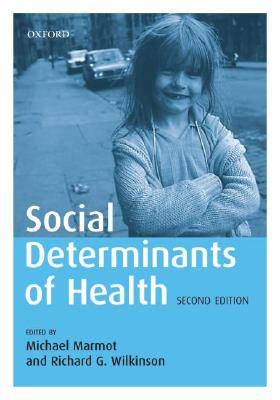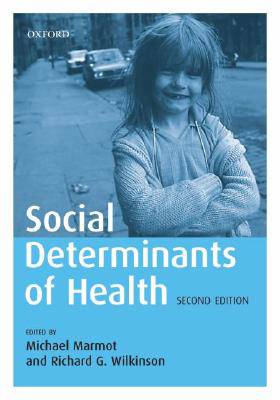
- Afhalen na 1 uur in een winkel met voorraad
- Gratis thuislevering in België vanaf € 30
- Ruim aanbod met 7 miljoen producten
- Afhalen na 1 uur in een winkel met voorraad
- Gratis thuislevering in België vanaf € 30
- Ruim aanbod met 7 miljoen producten
Zoeken
Omschrijving
Social Determinants of Health, 2E gives an authoritative overview of the social and economic factors which are known to be the most powerful determinants of population health in modern societies. Written by acknowledged experts in each field, it provides accessible summaries of the scientific
justification for isolating different aspects of social and economic life as the primary determinants of a population's health. The new edition takes account of the most recent research and also includes additional chapters on ethnicity and health, sexual behaviors, the elderly, housing and neighborhoods. Recognition of the power of socioeconomic factors as determinants of health came initially from research on health inequalities. This has led to a view of health as not simply about individual behavior or exposure to risk, but how the socially and economically structured way of life of a population
shapes its health. Thus exercise and accidents as as much about a society's transport system as about individual decisions; and the nation's diet involves agriculture, food manufacture, retailing, and personal incomes as much as individual choice. But a major new element in the picture we have
developed is the importance of the social, or psycho-social, environment to health. For example, health in the workplace for most employees - certainly for office workers - is less a matter of exposure to physical health hazards as of the social envrionment, of how supportive it is, whether people
have control over their work, whether their jobs are secure. A similar picture emerges in other areas ranging from the health importance of the emotional envrionment in early childhood to the need for more socially cohesive communities. Social Determinants of Health, 2E should be read by those interested in the wellbeing of modern societies. It is a must for public health professionals, for health promotion specialists, and for people working in the many fields of public policy which we now know make such an important contribution
to health.
justification for isolating different aspects of social and economic life as the primary determinants of a population's health. The new edition takes account of the most recent research and also includes additional chapters on ethnicity and health, sexual behaviors, the elderly, housing and neighborhoods. Recognition of the power of socioeconomic factors as determinants of health came initially from research on health inequalities. This has led to a view of health as not simply about individual behavior or exposure to risk, but how the socially and economically structured way of life of a population
shapes its health. Thus exercise and accidents as as much about a society's transport system as about individual decisions; and the nation's diet involves agriculture, food manufacture, retailing, and personal incomes as much as individual choice. But a major new element in the picture we have
developed is the importance of the social, or psycho-social, environment to health. For example, health in the workplace for most employees - certainly for office workers - is less a matter of exposure to physical health hazards as of the social envrionment, of how supportive it is, whether people
have control over their work, whether their jobs are secure. A similar picture emerges in other areas ranging from the health importance of the emotional envrionment in early childhood to the need for more socially cohesive communities. Social Determinants of Health, 2E should be read by those interested in the wellbeing of modern societies. It is a must for public health professionals, for health promotion specialists, and for people working in the many fields of public policy which we now know make such an important contribution
to health.
Specificaties
Betrokkenen
- Auteur(s):
- Uitgeverij:
Inhoud
- Aantal bladzijden:
- 376
- Taal:
- Engels
Eigenschappen
- Productcode (EAN):
- 9780198565895
- Verschijningsdatum:
- 1/11/2005
- Uitvoering:
- Paperback
- Formaat:
- Trade paperback (VS)
- Afmetingen:
- 239 mm x 168 mm
- Gewicht:
- 630 g

Alleen bij Standaard Boekhandel
+ 238 punten op je klantenkaart van Standaard Boekhandel
Beoordelingen
We publiceren alleen reviews die voldoen aan de voorwaarden voor reviews. Bekijk onze voorwaarden voor reviews.











